Coach wants Morrison to keep firing

It didn’t take long for Adam Morrison to find the bright side of the National Basketball Association preseason.
“At least these games don’t count,” he sighed.
Slumped into a locker room chair at the Dean Dome in Chapel Hill, N.C., Morrison was trying to dismiss a 2-of-11 shooting performance in Charlotte’s exhibition loss to the Washington Wizards. Two nights later in Indianapolis, that number would dip to 3 of 16 in a loss to the Pacers.
In his run to the NCAA scoring title in 2006, not once did Morrison’s shoot as low as 25 percent from the field in any Gonzaga game. But in a four-game stretch in the NBA preseason, the 6-foot-8 rookie from Spokane connected on just 12 of 48 attempts, to which Bobcats coach Bernie Bickerstaff had a counterintuitive reaction:
“Keep shooting,” he said.
Morrison’s transition to the professional game will be fitful, Bickerstaff acknowledged. But he couldn’t be more transparent as to why the Bobcats brought Morrison aboard with the No. 3 pick in last summer’s draft.
“He has to continue to shoot,” Bickerstaff said after the Chapel Hill game. “That’s what we want him to do and what his teammates want him to do. There were four or five opportunities after he’d missed a couple when he didn’t put it up – he went to the dribble and to the pass. But he’s got to shoot.
“We really don’t care how many attempts he has – we want him to shoot the basketball.”
And here you thought Morrison’s biggest NBA challenge would be playing defense.
OK, maybe it always will be. But it’s not nearly the concern you might believe.
Bickerstaff, the former Seattle SuperSonics coach now in his third season with the expansion Bobcats, has spent too many years in the NBA – this is his 30th – to be anything but candid about players and expectations, and it’s clear what’s expected of Morrison.
“When you talk about drafting players, there’s always that thing that defines them,” Bickerstaff said, “something they do better than anybody else, why they arrive at this level. And Adam scores. He scored and he shot 49 percent (in college) and he was the focal point of every defense. That’s what we need him to do.
“The teams I’ve had, even in Seattle – I had Dale Ellis and hell, he didn’t play defense. But when you can score like that, what happens? Your teammates better cover for you.”
Not that he always needs it. In his first preseason, Morrison has shown himself to be a willing defender – “the kid has lateral quickness,” said Bickerstaff, “he really does” – even if it wasn’t always against all-NBA talent. Shadowing the league’s better shooting guards and small forwards – whether they’re running around multiple screens or trying to break him down one-on-one – will be an ongoing education.
“And the biggest thing is, everybody can make shots,” said Morrison. “Some guys in college you didn’t have to guard and you could rest on defense. Not in this league.”
Yet there was that woeful stretch when it didn’t seem as if Morrison himself could make a shot – or get himself to the free-throw line under the NBA code that says rookies are due no particular regard from officials. Contact that was a two-shot foul at Gonzaga is accorded a mere shrug, and there were times it seemed as if Morrison was trying to hurry his less-contested looks.
But Bickerstaff was happier after the 3-of-16 game. Morrison’s persistence, even when shots weren’t falling, drew frequent defensive help from the Pacers, and opened up scoring opportunities for his teammates – which Morrison abetted with four assists.
“He has the ability to make teammates better,” Bickerstaff said. “You saw him do that some with (J.P.) Batista at Gonzaga, and he and Sean May play really well together. Just as long as he understands we want him to keep shooting.”
Anyone who ever saw Morrison play at Gonzaga knows he needed no encouragement to shoot – but he appreciates it now.
“What’s been nice here is that they’ve stayed positive with me,” he said. “They’ve been giving me the opportunity to make mistakes, which sometimes doesn’t happen with rookies.
“The biggest adjustment I’m trying to make is understanding when to make a play and when not to make a play. Last year, especially, I had the ultimate green light – I could pretty much take any shot at any time. I had the full confidence of the staff and my teammates. I feel like I have that here, but I know I have to prove myself and earn my keep.”